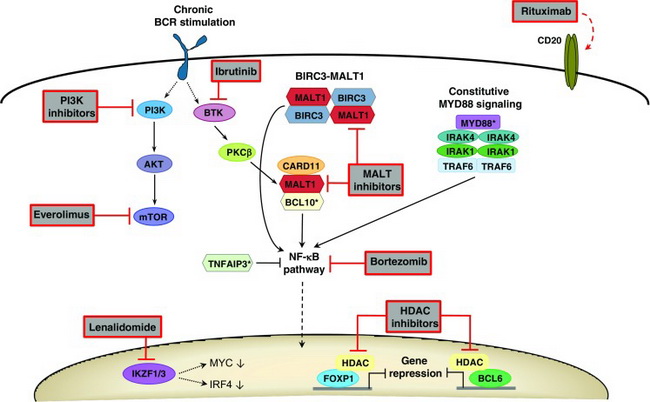MALT Lymphoma : Treatment


Comments:
Treatment of Early Stage MALT Lymphoma: Given the involvement of infectious agents in the pathogenesis of MALT lymphomas at several locations, antibiotic therapy is often the first line of treatment. Ocular adnexal MALT lymphomas regress following doxycycline treatment in 65% of cases. Similarly, a combination of amoxicillin and clarithromycin with a proton pump inhibitor for the treatment of H. pylori infection results in complete remission in 80% of cases of gastric MALT lymphomas in Stages I and II. Even H. pylori-negative cases respond to the antibiotic treatment since other microorganisms are known to be involved. Advanced Stages (Stages III & IV): Treatment consists of chemotherapy (bendamustine, fludarabine, or chlorambucil) along with anti-CD20 antibody Rituximab or the immunomodulatory drug lenalidomide. In cases that have progressed to diffuse large B-cell lymphomas, more aggressive regimens such as CHOP (cyclophosphamide, doxorubicin, vincristine, and prednisone) are used. Newer Targeted Therapies: Several novel agents targeting key enzymes that are active downstream of BCR signaling have been developed and are undergoing clinical trials (see diagram). They include: everolimus (inhibitor of mTOR pathway); vorinostat (inhibits histone deacetylases which play key roles in transcriptional regulation); bortezomib (inhibits 26s proteasome complex and triggers apoptosis in neoplastic cells); ibrutinib (inhibits Bruton's tyrosine kinase thereby blocking B-cell receptor pathway); idelalisib (blocks delta isoform of PI3K). Image source: Schreuder MI et al. Novel developments in the pathogenesis and diagnosis of extranodal marginal zone lymphoma. J Hematop. 2017 Dec. 10(3-4): 91-107. Used under Creative Commons Attribution 4.0 International License.



